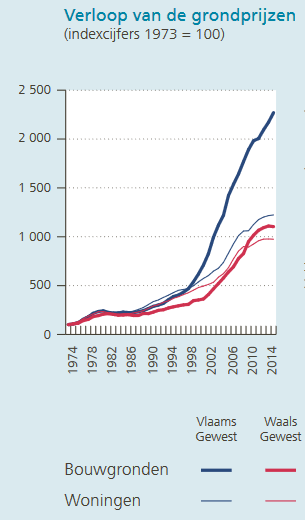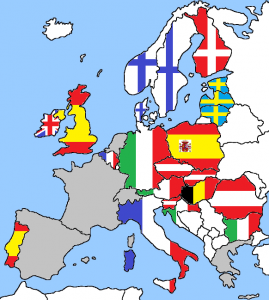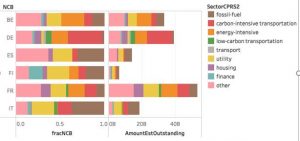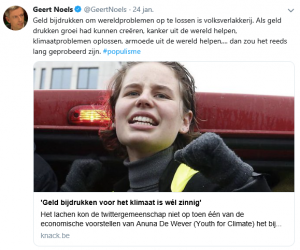See my tweets from a couple of weeks ago. I’ll have more to say on the blog (including the potential merger/acquisition of Commerzbank) if I find the time…
Author: JanMusschoot
Bouwgrondbezitters werden slapend rijk
Uit het jaarverslag van de Nationale Bank van België:

Tussen 1973 en 2014 zijn woningen in België 11 keer duurder geworden. Dat is vooral een gevolg van de gronden, die in dezelfde periode maar liefst 19 keer duurder werden. Zoals je in de figuur kan zien, waren de prijsstijgingen in Vlaanderen nog extremer dan in Wallonië.
Ter vergelijking: de consumptieprijzen zijn tussen 1973 en 2014 ‘slechts’ verviervoudigd. De bouwkosten gingen maal vijf.
“One step above the janitors”: a huge red flag for compliance culture
As a follow-up on yesterday’s post, read this story about how Deutsche Bank Trust Co. Americas handled payments from Dankse Bank‘s Estonian unit.
A number of quotes will give you an idea of the priorities at the bank:
[W]hen workers sought broader scrutiny of certain clients, they got a familiar response from some higher-ups, the officer said: Shut up, focus on the transaction in front of you, file your paperwork and move on.
Although U.S. executives routinely promised regulators they’d get tough, former staffers say such efforts were often disregarded in favor of cozy relationships with overseas customers.
Throughout Deutsche Bank, compliance staff members were considered to be “one step above the janitors,” an unnamed former executive told lawyers who filed a 2016 lawsuit against the bank.
In Jacksonville, that task [i.e. know your customer] fell to an office that was understaffed and overly permissive, insiders recall.
Money laundering doesn’t pay (for banks)
Swedish tv station SVT has investigated suspected money laundering by Russian and Ukranian customers of Swedbank. Oligarchs used accounts at Swedbank’s Estonian branch to move money offshore. The documentary is available online in English: part 1 and part 2.
At the end of part 2, Daria Kaleniuk, executive director of the Anti-Corruption Action Center in Kiev is asked “why do you think they [i.e., the bank] let this happen?”. Ms. Kaleniuk replies “because it’s profitable!”.
However, I’m not convinced that is true. Payments are a low-margin activity that expose banks to a lot of downside risk. Violating anti-money laundering (AML) rules have cost banks hundreds of millions of dollars in recent years.
In my opinion, criminals succeed in money laundering because compliance with AML regulation was (is?) not a priority for top executives.1 A lack of funding and management attention for compliance leads to a mentality of “just check the boxes, so it looks like we did what we had to do”.
Stronger enforcement, including higher fines and other sanctions, might change that situation.
Birgitte from Lehman Sisters
[A] higher share of women on the boards of banks […] is associated with greater stability. As I have said many times, if it had been Lehman Sisters rather than Lehman Brothers, the world might well look a lot different today. – Christine Lagarde, Managing Director of the International Monetary Fund
In today’s finance & crime news:
“Swedbank AB has fired its chief executive officer, Birgitte Bonnesen, amid allegations the bank was used to launder billions of dollars in Russian money on her watch.” – Bloomberg
For your information, five of the eleven members of Swedbank’s Board of Directors are women.
Foreign owned banks in Europe
How international is the European banking landscape?
Jamie Dimon, CEO of American bank JPMorgan Chase, says that European banks need mergers across borders in order to become more competitive. I created the map below to illustrate that Dimon has a point (that’s why he’s richer than you).

Some remarks and observations: Continue reading “Foreign owned banks in Europe”
How the ECB can align its monetary policy with the climate targets of the EU
There is a discussion going on about how climate change should influence central banking. The Veblen Institute and Positive Money Europe have published a study which shows that although the European Central Bank (ECB) has acknowledged its responsability, bonds issued by carbon intensive companies make up a large fraction of the corporate bonds held by the ECB.

You can find the report (in French) here.
Update 7 April 2019: for the English version, click here.
De banken werven aan
Vorig jaar zijn er 3000 banen gesneuveld in de Belgische financiële sector. AXA en BNP Paribas Fortis hebben aangekondigd dat ze hun personeelsbestand nog verder zullen inkrimpen.
Daarbij wordt vaak over het hoofd gezien dat de banken tegelijk ook nieuwe mensen aanwerven.
Recent gaf ik een gastcollege voor studenten financie- en verzekeringswezen. Door de negatieve berichtgeving zijn er erg weinig jongeren die deze richting kiezen. Zoals je in Hoe bankiers geld scheppen kan lezen, heeft de sector echter dringend bankiers nodig die met de nieuwste technologie kunnen omgaan en die hun klanten persoonlijk advies kunnen geven.
Het ziet er naar uit dat de kranten over enkele jaren zullen schrijven “Banken wanhopig op zoek naar personeel”.
Wiskunde-memes
Integratieconstante niet vergeten




…maar geen c bij bepaalde integraal!

Bewerkingen met haakjes

Negatieve wortel van een kwadraat niet vergeten

Wiskunde in het echte leven


Tenslotte nog een heleboel analyse in de Queen-parodie Calculus Rhapsody:
Anuna heeft gelijk
Klimaatspijbelaarster Anuna De Wever stelt voor dat de overheid geld drukt om de klimaatproblemen aan te pakken.
De “serieuze economen” en hun kudde volgers op de sociale media rolden over elkaar om haar voorstel in het belachelijke te trekken. ‘Dat gaat in tegen de wetten van de economie!’ ‘Heeft dat kind nog nooit van Venezuela en Zimbabwe gehoord?’ ‘Hyperinflatie!’

Ironisch genoeg heeft Anuna het bij het rechte eind. Ondanks de lage rente en de massale aankoop van obligaties slaagt de Europese Centrale Bank (ECB) er niet in om haar inflatiedoelen te halen. Het nieuw ‘gedrukte’ geld uitgeven aan groene investeringen zou goed zijn voor de economische groei, werkgelegenheid, concurrentiekracht (goedkopere stroom) en de klimaatdoelstellingen van de Europese Unie.
Het internationaal debat over Green QE is al jaren aan de gang, maar dat hebben de Belgische economen duidelijk gemist.
Media-economen als Geert Noels maken zich graag populair door te klagen over de lage rente, hoge belastingen en het gebrek aan klimaatmaatregelen. Maar doordat ze de mensen bang maken met doemscenario’s over hyperinflatie, zijn ze deel van het probleem.
De Europese politiek heeft de voorbije tien jaar verkwanseld. In plaats van investeringen te doen in het door werkloosheid geteisterde Zuid-Europa, gebeurde er niets.
Het resultaat: de voorbije tien jaar hebben we teveel belastingen betaald, zaten miljoenen mensen zonder werk, haalde de ECB haar inflatiedoelen niet, zal de Europese Unie haar klimaatdoelen niet halen, is er onvoldoende geïnvesteerd in klimaatvriendelijke technologie, betalen we miljarden voor fossiele brandstoffen uit Saudi-Arabië en Rusland…
Iemand met een slecht karakter zou Geert Noels ervan kunnen verdenken een door Poetin aangestuurde onruststoker te zijn. In werkelijkheid ligt het probleem vooral bij de bloedarmoede in de media, waardoor steeds dezelfde kwakzalvers een forum krijgen.
Meer weten?
- ‘Geld bijdrukken voor het klimaat is wel zinnig’ door Hielke Van Doorslaer
- Mijn plan voor Green QE (in het Engels)
- Wie Hoe bankiers geld scheppen leest, zal meer weten over financiële macro-economie dan Geert Noels.
